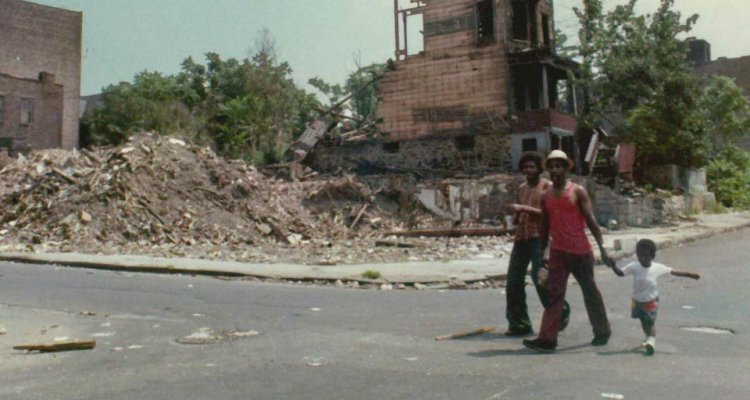In a dubious/devious practice that would probably make both Donald and Fred Trump proud, in the 1930s, New York City began a gentrification process known as “redlining.” Any neighborhood whose Black and/or Hispanic population had grown to house 5-10% of the overall residencies was labeled a “declining community.” By the ‘70s, these so-called slums were often torn down, sometimes a result of raging building fires. A concept called “urban renewal” was formed. James Baldwin (writer of “If Beale Street Could Talk”) doesn’t beat around the bush with political vocabulary, “[Urban renewal] means negro removal,” plain and simple.
READ MORE: The 100 Most Anticipated Films Of 2019
Co-directed by Bronx native Vivian Vázquez Irizarry and Gretchen Hildebra, the enlightening documentary, “Decade of Fire,” is an affecting and educational accounting of the countless infernos that displaced and deteriorated the lives of so many throughout the 1970s. Over 100,000 residents of “declining” buildings were unofficially labeled second-class citizens, forcing neighbors with different ethnic backgrounds to integrate themselves into tightly knit communities. Struggling families often squeezed into the smallest of spaces, while their backyards were treated as city-wide garbage dumps. Vivian Vázquez Irizarry was born in one of these living situations.
READ MORE: Tribeca Film Festival: 15 Must-See Movies
‘Decade’ begins with the co-director returning to the old building she grew up in. Recalling the story of hundreds of thousands of Puerto Rican immigrants that left for American in search of a better life, Vivian tells her adult son their family’s tale. Once you had made your way to New York City, moving to the Bronx was a step up from Harlem. “It felt like we were all the same,” her mother reflects, about the diverse racial community. “Where we set our roots is part of the legacy of who we are.”
But the story of these blazing fires is the story of an entire city, not one family. Alongside newsreel footage, a variety of personal accounts and experiences are captured through interviews. Combining personal anecdotes with a research-heavy approach, including the co-directors own diligent document digging, the academically driven documentary is emotionally admirable— every face captured on camera, and all of the expressed accountings being distinct and memorable. But ‘Decade’ packs a lot, a lot of information into just over an hour and it can often be too overwhelming for its compact editing.
While over a half million people lost their homes, approximately double that number of middle-class citizens fled the city’s “immigrant invasion,” in what would come to be known as the “white flight.” False reports littered daily news stories about fires caused by drug wars, with the actual housing policies rarely ever discussed. Quite often, gangs were paid off by insurance brokers to burn buildings they lived in. While kids hovered their hands over ovens and heaters to stay warm, morally sketchy brokers, able to take advantage, were lining their pockets with the insurance proceeds; nothing said they were legally required to spend this kickback money on constructed renovations. All the while, a person one had known for years would simply up and disappear; far too many were too young and naïve to understand why these things were happening.
For all its humanistic resonance, ‘Decade’ verges on playing more like an intricate power-point presentation of a city’s social relations than a powerful emotional documentary. The material is all there, but the formal approach is (ironically) without a strong narrative structure. Cinematic artistry is not the priority. On the positive side, this allows every talking head that’s a part of the group discussion to voice their opinion and participate. A local business owner chats about the history of his record store. An African American woman talks about witnessing the inception of hip-hop, firsthand. Jimmy Carter promises more funding for neglected neighborhoods. (The money never arrived because Ronald Reagan was elected President). All these threads are undeniably impressive, and important stories to tell, only the doc crams too many of them into very tight quarters (its basically 70 minutes, without credits).
“Decade of Fire” occasionally comes off like a powerful news story that feels the need to include every vital piece of information, sometimes at the expense of emotional feeling. There’s a scene towards the end where the co-director seems on the verge of breaking down in disbelief, as she reads poorly kept official records and documents about the fires that are just inherently baffling. One could argue, it might be the closest the movie comes to having a meaningful “character” catharsis, but the film chooses not to linger on this moment of sensation. ‘Decade’ seems less concerned, and is sadly less successful, with creating emotional impact than it is in formally educating. It is a personal project that cares about providing an inclusive channel of accurate information, much more so than impressing an audience with the poetry of its film grammar. It tells a lot of great stories and illuminates a city-wide tragedy, but given all the heartbreaking and enraging stories within, one wishes “Decade Of Fire” could emotionally sear and rage just as well as it educates. [B-]

